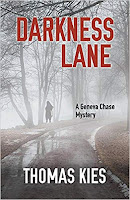We live in a violent world. In books, movies, television shows, video games…the news.
Recently, there was a mass shooting at UNC Chapel Hill. Two people were killed.
The mass shootings over the last few years have been horrific. 58 killed in Las Vegas in 2017. 49 killed in the Pulse nightclub in Florida. 32 killed at Virginia Tech in 2007. That doesn't even count the terrible shootings in our high schools and and elementary schools. I was ashamed that when I heard the body count at Chapel Hill, I almost felt a sense of relief that it wasn't higher. That's just wrong.
The world is awash in violence, either man-made or from natural causes. Wars, fires, famine, floods, hurricanes, tornadoes.
So, why do we enjoy reading mysteries? They're inherently violent. In almost all mysteries, someone dies. But the beautiful thing about a novel, generally speaking, justice is exacted by the conclusion. The bad guys (or ladies) are uncovered and arrested or otherwise dispatched.
How much violence is too much? It depends on the writer and it depends on the audience.
Late last year, I read Hank Phillippi Ryan’s mystery,
Trust Me. Death definitely has a seat on this bus, but her book is far from being violent. It’s a excellent psychological thriller. It quietly pulls you along with enough twists and turns to keep you guessing and on the edge of your seat. The gore level is very low and the storytelling is topnotch.
At about the same time, I read Stephen Mack Jones’ first book,
August Snow. Full disclosure, I liked it so much, I’m currently reading his second novel,
Lives Laid Away. The violence level is stepped up, but you’d expect as much when your protagonist is a retired Marine and an ex-cop. There are going to be fist fights and gun play and Jones makes it work without making it cringe-worthy. You genuinely like the characters and hope they live through their violent travails.
On the other end of the spectrum is Don Winslow’s new book,
The Border. At slightly more than 700 pages, it’s on a scale with Mario Puzo’s
The Godfather. This book is raw, gritty, and very, very violent. But it’s about drug cartels, addicts, DEA agents, Mexican Federales, and dirty politicians. Is it for everyone? Of course not. Personally, I loved it. Couldn't put it down.
My own Geneva Chase series has been described as dark and sinister. But most of the violence in my novels takes place off the set. You don’t actually see the violence, but you witness the aftermath and the ramifications. And make no mistake, there will be at least one life or death struggle.
These are my personal rules on violence:

It can’t be gratuitous. There must be a point to it. That act of violence has to move the narrative forward or bring the story to its conclusion.
Limited gore. There should be enough to make it real, but don’t make it gore porn.
Don’t glorify violence. Show it for what it is—ugly and scary.
Show the ramifications. In
Darkness Lane, Geneva Chase has discovered the body of a murdered man. He’d been tortured and beaten to death. The scene so rattled her that it keeps popping up in her head. She keeps thinking, "His head was bashed in." Over and over. Something akin to PTSD.
I’m fussy about the body count. If I want to see a massive loss of life, I’ll watch
Game of Thrones.
Speaking about violence, I’m glued to the television as the last episodes of
Game of Thrones play out. I love the series because of the character development and byzantine plot lines and no one is safe.
But it’s not for everyone, Cindy, my wife, won’t watch it because, in the very first episode, someone kills a dire wolf. Cindy saw that and she was out of the room.
Oh yes, one last Thomas Kies rule on violence. It was the subject of an earlier blog. Never hurt a dog.



